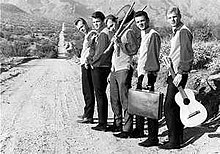
The Beau Brummels was an American rock band. Formed in San Francisco in 1964, the band's original lineup included Sal Valentino, Ron Elliott, Ron Meagher, Declan Mulligan, and John Petersen (drums). They were discovered by local disc jockeys who were looking to sign acts to their new label, Autumn Records, where Sylvester Stewart—later known as Sly Stone—produced the group's early recording sessions. Initially, the band's musical style blended beat music and folk music and typically drew comparisons to the Beatles, while their later work incorporated other music genres such as psychedelic rock and country rock.
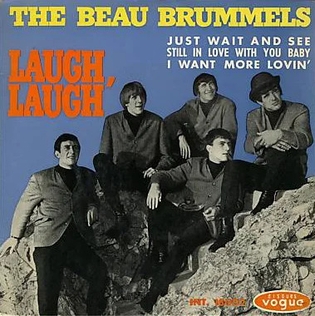
"Laugh, Laugh" is a song by American rock group The Beau Brummels, written by guitarist Ron Elliott and produced by Sylvester Stewart, later known as Sly Stone. Released in December 1964 as the band's debut single, the song reached number 15 on the U.S. Billboard Hot 100 chart the following February. "Laugh, Laugh" was the first hit single to come out of the emerging San Francisco music scene in response to the British Invasion. The song was later included on the band's first full-length album, Introducing the Beau Brummels, released in April 1965.

Triangle is the fourth studio album by American rock band The Beau Brummels. Produced by Lenny Waronker and released in July 1967, it was the band's first album to include songs that vocalist Sal Valentino and guitarist Ron Elliott composed together. The band incorporated fantasy elements and surreal characters into the album's song titles and lyrics, and worked with a variety of session musicians to create Triangle's psychedelic musical style. The Beau Brummels were reduced to a trio—Valentino, Elliott, and Ron Meagher—at the time Triangle was recorded, as former group members Don Irving (guitars) and John Petersen (drums) left the band following the release of the group's previous album, Beau Brummels '66.

"Just a Little" is a song by American rock group The Beau Brummels. The song is included on the band's debut album, Introducing the Beau Brummels, and was released as its second single, following "Laugh, Laugh". "Just a Little" became the band's highest-charting U.S. single, peaking at number eight on the Billboard Hot 100 in June 1965. It also reached the top 10 of the charts in Canada and Australia.

"Don't Talk to Strangers" is a song by American rock group The Beau Brummels, released as the second single from the band's second album, The Beau Brummels, Volume 2. The song later appeared on the band's 1987 compilation album The Best of The Beau Brummels 1964–1968. The single peaked at number 52 on the Billboard Hot 100 in November 1965; its relatively low chart placement possibly being the result of the band's label, Autumn Records, verging on collapse at the time. The song reached number 16 on the Canadian singles chart.
"Good Time Music" is a song originally recorded by American pop rock band the Lovin' Spoonful in 1965. Written by John Sebastian, it appeared on the 1966 Elektra Records compilation What's Shakin'. The song has been described as "a sort of manifeseto of the group's optimism in its jaunty rhythms and celebration of the return of good time music to the radio."
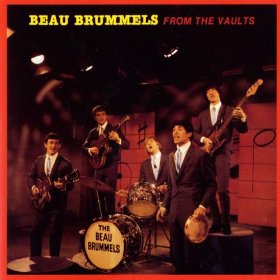
From the Vaults is a compilation album by American rock band The Beau Brummels. It was released in 1982 by Rhino Records, and reissued in 1999 by One Way Records. The album contains 14 songs, including rare or previously unreleased material recorded by the band between 1964 and 1966.
Green Crystal Ties is an extensive series of compilation albums focusing on obscure and relatively unknown psychedelic and garage rock musical artists that recorded during the 1960s and early 1970s. Released on Collectables Records, Green Crystal Ties features ten total albums, all of which were issued in 1998. For the most part, the albums expand on past series distributed by Collectables Records and its contemporary Cicadelic Records, and as with Nuggets employ original master source elements when possible and arrange the various installments along contextual and conceptual lines. The music tends to be more refined in the earlier volumes of the series, progressively venturing out into more obscure and unknown material later much in the same fashion as the Pebbles or Back from the Grave series. The various installments are not ordered chronologically, but instead place emphasis on certain regions or musical styles. Although most of the music was recorded by American groups, there are a few exceptions such the heavy metal band Black Sabbath and King Richard and the Knights. Green Crystal Ties pays homage to the band the Zakary Thaks and their song of the same name. All of the entries are housed highly colorful packaging designed by Nicole Ruhl Fichera and each features a photograph one of one of the compiled bands on the front cover. The packaging for all entries includes well-researched liner notes written by Steve Kaplan and Matt Wendelken which provide helpful biographical information about the bands and their songs.
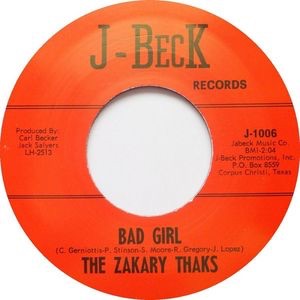
"Bad Girl" is a song by the American garage rock band the Zakary Thaks, written by the whole group—Chris Gerniottis, Pete Stinson, Stan Moore, Rex Gregory, and John Lopez—and was first released for the band's debut single on J-Beck Records in July 1966. The song was an immensely successful regional hit in Texas, precipitating "Bad Girl"'s national release on Mercury Records later in the year. Since its initial distribution, the tune has received further recognition for its appearance on several compilation albums.
The Mad Hatters were an American garage rock band from Annapolis, Maryland who were active in the 1960s and had a following in the Washington DC and Baltimore area. They enjoyed brief local and regional success with their first single, "I Need Love," released in 1965, later recorded by the Time Stoppers. Though they failed to reach a wider audience, in the intervening years since their breakup they have become known amongst garage rock collectors and enthusiasts. Their 1966 song "I'll Come Running" has also become a song highly regarded amongst enthusiasts.

The Liberty Bell was an American garage rock/psychedelic rock band from Corpus Christi, Texas who were active in the 1960s. They specialized in a blues-based brand of proto-punk influenced by British groups such as the Yardbirds. The band failed to reach wider audience in the time, but have come to the attention of garage rock collectors and enthusiasts in the intervening years since their breakup, with their work appearing on several compilations.
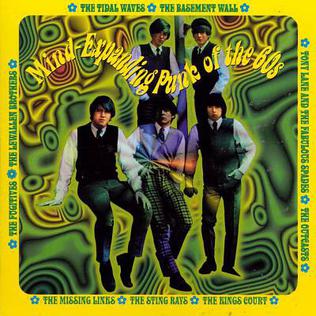
Green Crystal Ties, Volume 7: Mind-Expanding Punk of the 60s is a compilation album featuring American psychedelic and garage rock musical artists that recorded in the 1960s. It is the seventh installment of the Green Crystal Ties series and was released on Collectables Records on April 7, 1998. The album is not so "Mind-Expanding"—alluding to psychedelic music -- Volume 7 does offer the most hard-edged musical stance within the series.

Green Crystal Ties, Volume 3: Gloria Meets 96 Tears is the third installment in the Green Crystal Ties series of psychedelic and garage rock compilations issued by Collectables Records. It was released on April 7, 1998 and features songs by obscure American musical artists who recorded in the 1960s. Like all of the entries in the series, the highly colorful packaging is designed by Nicole Ruhl Fichera and on this occasion features a front cover photograph of Yesterday's Children, who are included in this set. The inner sleeve includes well-researched liner notes written by Steve Kaplan and Matt Wendelken which provide helpful biographical information about the bands and their songs.

The Stillroven were an American garage rock and psychedelic band from Robbinsdale, Minnesota, outside of Minneapolis, who were active in 1965-1969. They became a local success, enjoying a hit in the Twin Cites area with their version of "Hey Joe". In hopes of reaching a wider audience they relocated, playing for a short time in Tucson, Arizona, but eventually moved their base of operations to Denver, Colorado, where they briefly signed to A&M Records, recording an unreleased album for the label. The group made recordings at Norman Petty's studio in Clovis, New Mexico, before moving to Washington, DC in 1969 and auditioning in New York City to secure another recording arrangement that never materialized. In the intervening years since their breakup in 1969, the group's work has attracted the attention of garage rock and psychedelic enthusiasts and has been included on various re-issues and compilations.
The Nomads were an American garage rock/psychedelic rock band from Texas City, Texas near Galveston who were active in the 1960s. The band was known for Brian Collins' passionate vocals and a melodic guitar sound. They are not to confused with a number of other bands using the same name in Texas and elsewhere, such as the Nomads from Fort Worth and the Nomads from Mount Airy, North Carolina.
The Stumblin' Blox were an American garage rock band from Abilene, Texas who were active in the 1960s. They are known for songs such as "It's Alright." Though they failed to achieve commercial success, their works have come to the attention of garage rock enthusiasts and collectors over the years and have been included several compilations.

The North Atlantic Invasion Force was an American garage rock band from New Haven, Connecticut who were active in the 1960s. They were led by vocalist and principal songwriter George Morgio, many of whose song lyrics were concerned with interpersonal relationships or were otherwise topical in nature, focusing issues such as free speech and the ongoing war in Vietnam.
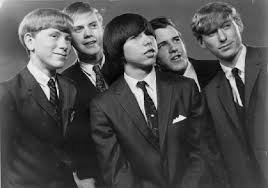
The Tidal Waves were an American garage rock band formed in Roseville, Michigan, in 1964. Despite the young ages of the group members, the Tidal Waves were one of the more accomplished musical acts in the bustling Michigan garage band scene. They are best remembered for their regional hit, a cover version of "Farmer John", which managed to reach the Top 10 of several radio station charts around Detroit.

The Dearly Beloved were an American garage rock band from Tucson, Arizona, originally known as the Intruders, who began as an instrumental surf rock combo, but eventually incorporated vocals into their sound after the rise of the British Invasion. After recording their first single as the Intruders, they changed their name to Quinstrels, recording one single under that moniker, but later settling upon the name for which they are best known, the Dearly Beloved. Along with the Grodes, they became one of the top groups in the Tucson area, scoring a #1 hit in there, and were on the cusp of breaking to a wider national audience, even briefly recording with Columbia Records and receiving some airtime on radios stations in other parts of the country, but were unable to maintain the momentum long enough to achieve wider success. Their work is nonetheless highly regarded amongst garage rock and psychedelic enthusiasts.

The Kreeg were an American garage rock band from Albuquerque, New Mexico who were active in the 1960s. They were one of the most popular groups in the Albuquerque area and enjoyed local hits from both sides of their 1966 single "How Can I" b/w "Impressin'". Their work has come to the attention of garage rock enthusiasts with the release of the 1996 anthology Impressin', which features their complete recordings.
